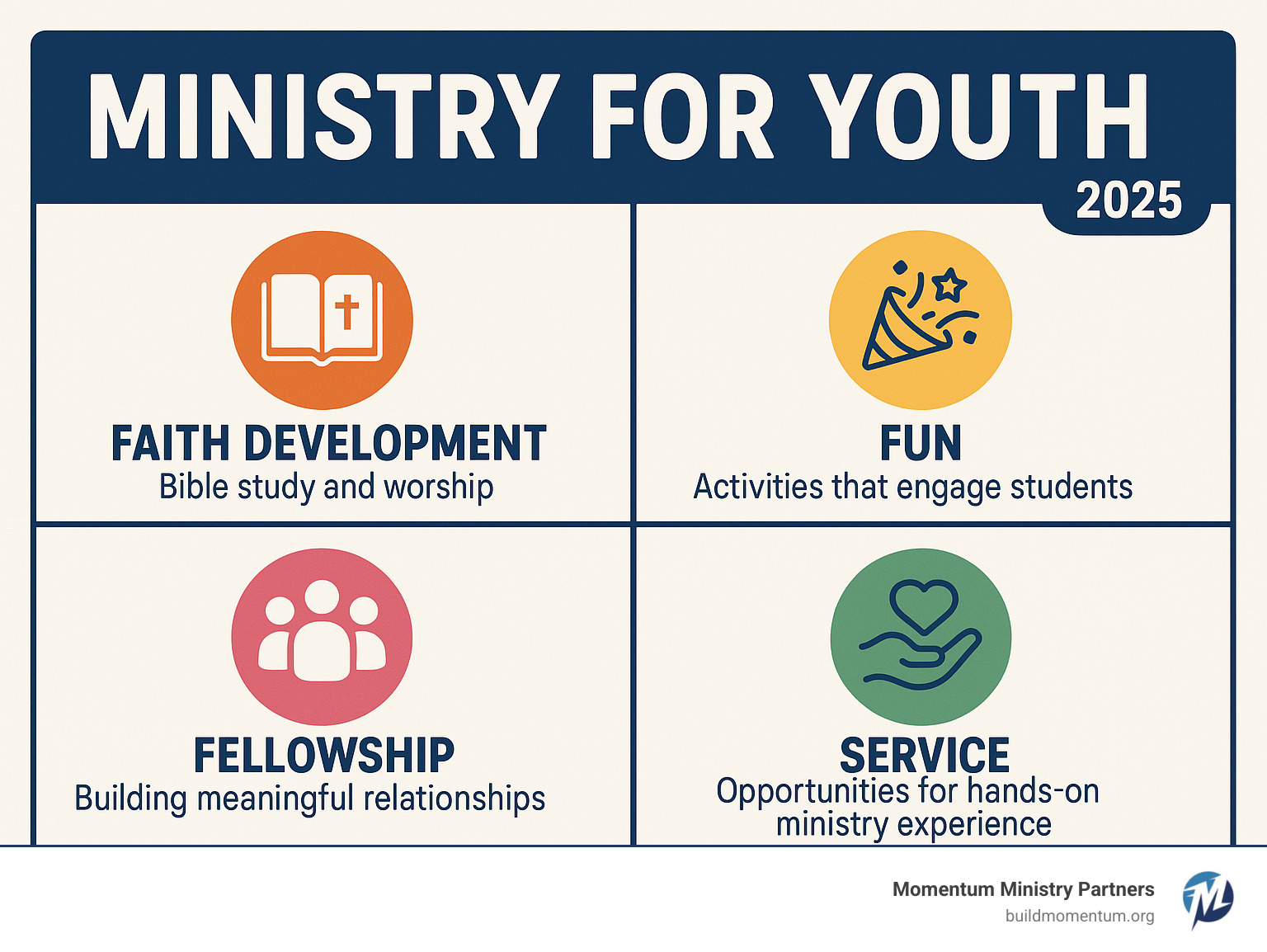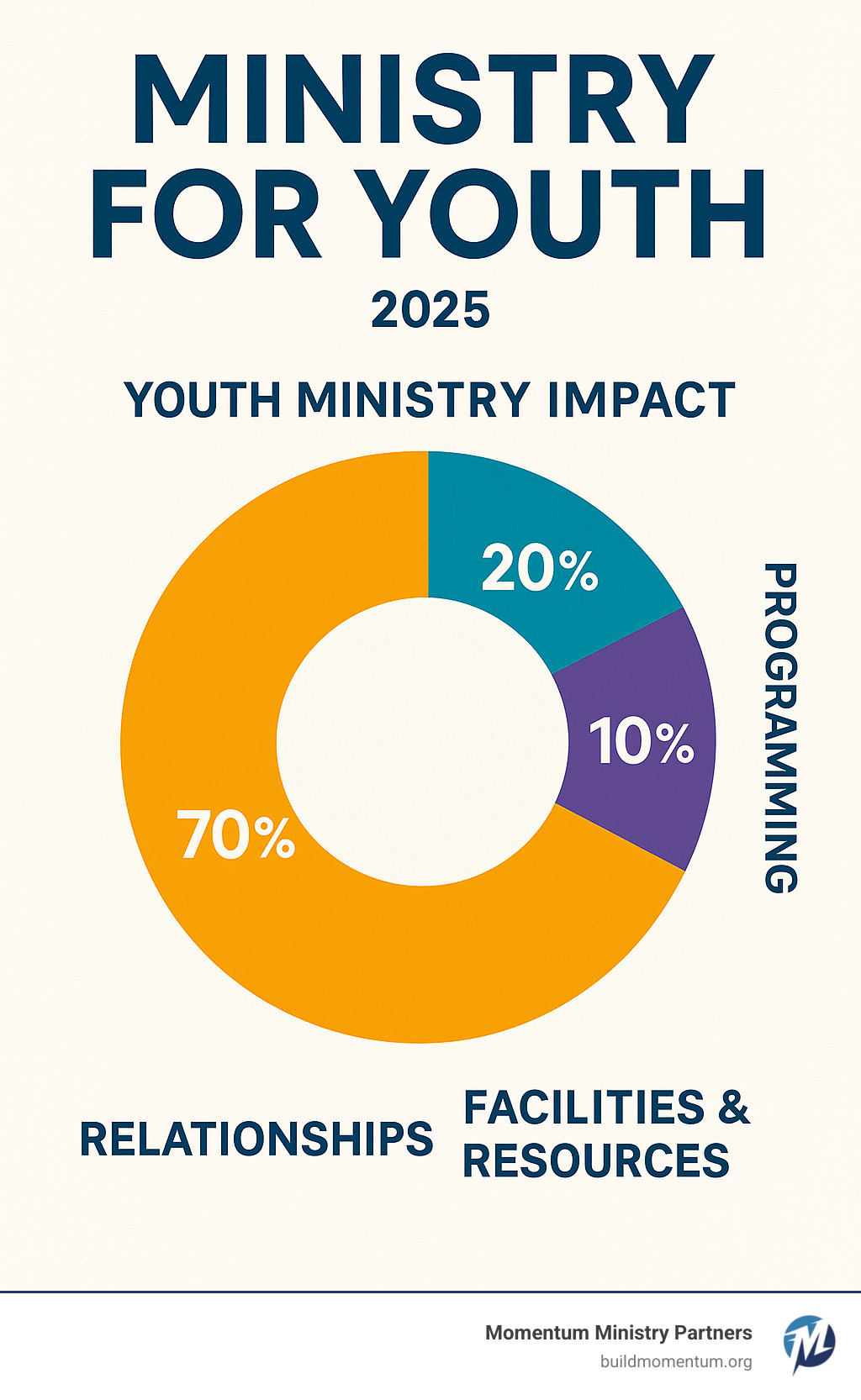Why Ministry for Youth is Essential for Every Church
Ministry for youth is an age-specific religious ministry that focuses on engaging young people, typically ages 12-30, in spiritual life and community. At its core, youth ministry aims to:
- Involve and engage young people in their faith journey
- Foster spiritual growth through biblical teaching and discipleship
- Create community where teens can build meaningful relationships
- Develop leadership skills for future church involvement
- Provide a safe space to explore faith and life questions
Youth ministry serves as a bridge between childhood Sunday school and adult church participation. It recognizes that teenagers have unique developmental needs, social pressures, and spiritual questions that require specialized attention and programming.
The structure and approach of youth ministries vary significantly across churches. Some emphasize high-energy programs with games and activities, while others focus on deep Bible study and discipleship. What remains constant is the goal of pointing students toward Jesus and equipping them for a lifetime of faith.
Many youth ministries face common challenges including student apathy, budget constraints, volunteer burnout, and cultural pressures. However, research shows that effective youth ministry can have lasting impact on young people’s spiritual development and church involvement throughout their lives.
As someone who has spent over three decades in pastoral leadership, I’m Jeff Bogue, and I’ve witnessed how powerful ministry for youth can be in shaping the next generation of believers. Through my work with Momentum Ministry Partners and Grace Church, I’ve seen countless young people find their calling and develop into strong Christian leaders.

Understanding the Core of Youth Ministry
Ministry for youth is like building a bridge, helping young people cross from childhood into adulthood with their faith intact. This work is unique because you’re ministering to people who are still forming their identity, beliefs, and worldview amidst pressures unique to their generation.
The core objectives work together to nourish young souls:
- Discipleship: This is the heart of youth ministry. It’s about helping teenagers build a personal relationship with Jesus and learn to follow Him daily, not just memorizing Bible facts.
- Spiritual Growth: We create environments where students can grow through studying God’s Word, engaging in worship, learning to pray, and serving others.
- Fostering Community: In an age of digital isolation, youth group provides a place for genuine relationships where students can be themselves, ask hard questions, and find support.
- Evangelism and Outreach: When students feel loved and confident in their faith, they naturally become effective at reaching their friends.
- Creating a Safe Space: Perhaps most importantly, youth ministry must be a place where students can share doubts, struggles, and questions without fear of judgment.
The ultimate goal isn’t just entertainment; it’s developing mature followers of Christ. This requires intentional programming that addresses their spiritual, emotional, social, and intellectual needs.
For deeper insights into nurturing spiritual growth, check out our resource on The Basics of Spiritual Growth in Students. Our guide on 3 Essentials to Effective Student Discipleship offers practical strategies for deepening student relationships with Christ. And since identity formation is so crucial during these years, How Can We Help Students Find Their Identity provides valuable insights every youth leader needs.
The Structure of an Effective Ministry for Youth

Building an effective ministry for youth isn’t about copying what works at the mega-church down the street. It’s about understanding your unique context and choosing the right model for your students and community. After decades of working with churches of all sizes, I’ve learned that the most successful youth ministries share certain foundational principles, even when their programming looks completely different.
The heart of any effective youth ministry structure beats with relational ministry. This approach puts people over programs every single time. When students know that adults genuinely care about them as individuals – not just as attendance numbers – everything changes. Relational ministry means showing up to soccer games, remembering important events in students’ lives, and being available when they’re struggling. Research consistently shows that students who have meaningful relationships with adult mentors are far more likely to maintain their faith into adulthood.
Family-based ministry recognizes a truth that many youth ministries miss: parents are the primary spiritual influencers in their children’s lives. Instead of competing with families for students’ time and attention, effective youth ministries become partners with parents. This might look like hosting parent-student events, providing family devotional resources, or simply keeping parents informed about what their teens are learning and experiencing.
Student-led ministry empowers young people to take ownership of their spiritual growth and ministry involvement. When students help plan events, lead small groups, or serve in ministry roles, they develop leadership skills and deeper investment in the program’s success. More importantly, ministry feels more authentic and relevant when students have a voice in shaping it.
The most effective programs don’t choose just one approach – they blend elements from all these models. A small church might focus heavily on relational ministry while gradually incorporating student leadership opportunities. A larger church might have structured programs but ensure each student has a meaningful relationship with an adult mentor.
The key is maintaining flexibility to adapt your approach based on your specific context and student needs. What works in an urban setting might not translate to a rural community. What engages middle schoolers might bore high schoolers. Effective youth ministry structure grows and evolves with your students and community.
For insights on where youth ministry is heading and how to prepare for future challenges, read The Future of Youth Ministry Starts Here.
Key Leadership Roles and Qualifications
Strong leadership makes or breaks ministry for youth. While specific titles and organizational structures vary from church to church, most successful youth ministries include several key roles that work together to create a comprehensive program.
The Youth Pastor or Youth Minister typically serves as the primary leader, responsible for casting vision, developing programs, and providing overall ministry direction. This role requires a unique combination of pastoral skills, teaching ability, and cultural awareness. Youth pastors must connect authentically with teenagers while also communicating effectively with parents and church leadership – sometimes feeling like translators between two different worlds.
Educational requirements for youth ministry leaders vary significantly across churches and denominations. Many churches prefer candidates with formal theological training, and numerous Christian universities now offer undergraduate and graduate degrees specifically in youth ministry. However, passion for young people, strong character, and ministry experience often matter more than academic credentials. Some of the most effective youth leaders I know learned their skills through hands-on experience and mentoring relationships.
Volunteers form the backbone of most youth ministries. These lay leaders might include parents, college students, young adults, or other church members who feel called to invest in the next generation. Effective youth ministries maintain a healthy ratio of adults to students – typically one adult for every six to eight students. This ensures adequate supervision while providing opportunities for meaningful relationships.
The vetting process for youth ministry leaders has become increasingly important in recent years. Most churches now require background checks, reference checks, and specific training for anyone working with minors. This protects both students and volunteers while maintaining the trust of parents and the broader community. The process might feel burdensome, but it’s essential for creating a safe environment where ministry can flourish.
Key qualities for youth ministry leaders include empathy, patience, strong faith, and the ability to communicate effectively with teenagers. Leaders must handle difficult conversations, maintain appropriate boundaries, and model healthy Christian living. Cultural awareness is increasingly important as student populations become more diverse and face new challenges.
Building strong relationships between senior pastors and youth pastors is crucial for ministry success. Our resource on The Pastor-Youth Pastor Relationship provides valuable guidance for navigating this important partnership.
Curriculum, Resources, and Common Topics for a Ministry for Youth
Effective youth ministry programming addresses the real issues students face while grounding them in biblical truth. The most impactful curricula combine relevant topics with solid theological foundation, helping students see how Scripture applies to their daily lives – not just their Sunday mornings.
Students today face challenges that previous generations never imagined. Identity questions run deeper when social media constantly presents curated versions of other people’s lives. Peer pressure takes new forms through digital platforms. Dating and relationships become more complex with changing cultural norms. Mental health issues like anxiety and depression affect students at unprecedented rates.
Social media creates both opportunities and dangers that require wisdom to steer. Students need help understanding how to maintain authentic relationships in a digital world. Faith and doubt questions deserve honest discussion rather than dismissive answers. Future planning feels overwhelming when the world changes so rapidly.
The key is addressing these topics with both biblical wisdom and practical application. Students need to understand not just what the Bible says, but how to live it out in their specific context. They’re looking for authenticity, not platitudes.
At Momentum Ministry Partners, we’ve developed comprehensive resources that help youth leaders steer these challenging topics with confidence. Our materials combine solid biblical teaching with practical activities and discussion questions that engage students meaningfully.
Bible studies remain a cornerstone of youth ministry curriculum. However, the most effective programs go beyond traditional verse-by-verse studies to include topical lessons that address current issues, character studies that provide role models, and practical applications that help students live out their faith.
Quality matters more than cost when selecting curriculum and resources. The time invested in developing or adapting materials is time not spent building relationships with students and families. Investing in high-quality resources often pays dividends in both effectiveness and efficiency.
For guidance on selecting appropriate topics, check out Youth Ministry Radar: Navigating Youth Group Topics.
Navigating Common Challenges in Youth Ministry

Every youth ministry faces challenges, but understanding common obstacles and developing strategies to address them can significantly improve your program’s effectiveness. The most successful youth ministries aren’t those that avoid problems, but those that steer them with wisdom and grace.
Low attendance can discourage even the most dedicated youth leaders. Rather than focusing solely on numbers, consider the quality of relationships and spiritual growth happening in your ministry. Sometimes smaller groups allow for deeper connections and more meaningful discipleship. That said, if attendance is consistently declining, it may indicate needed changes in programming, leadership, or approach.
Budget constraints affect most youth ministries, but creativity can overcome many financial limitations. Focus on relationship-building activities that require minimal resources. Partner with other churches for larger events. Use free community resources like parks and recreation facilities. The most transformative ministry experiences often happen in simple settings with minimal cost.
Volunteer burnout threatens the sustainability of many youth ministries. Prevent burnout by clearly defining roles and expectations, providing adequate training and support, and rotating responsibilities among team members. Recognize that volunteers have lives outside of youth ministry and respect their boundaries.
Cultural pressures continue to intensify as society shifts away from Christian values. Rather than fighting culture wars, focus on equipping students to engage their culture thoughtfully and redemptively. Help them understand how to live as faithful Christians in a pluralistic society without compromising their beliefs or becoming unnecessarily combative.
Engaging parents remains a persistent challenge. Many parents feel disconnected from their teenagers’ spiritual lives and appreciate partnership with youth ministry. Regular communication, parent-student events, and resources for family devotions can help bridge this gap. Parents are your allies, not your competition.
Mental health issues among teenagers have reached crisis levels, requiring youth leaders to develop new skills and awareness. While youth pastors aren’t professional counselors, they can provide initial support and connect students with appropriate resources, such as those provided by the National Alliance on Mental Illness (NAMI). Creating an environment where students feel safe discussing their struggles is crucial.
For insights on addressing current cultural challenges, read 3 Disturbing Cultural Trends Youth Pastors Need to Address. Our resource on Christian Mental Health: Walking Alongside Youth provides guidance for supporting students’ emotional well-being. Additionally, 5 Simple Ways Youth Leaders Connect with Parents offers practical strategies for building stronger family partnerships.

Approaches to Youth Ministry in Different Contexts

No two communities look the same, so effective ministry for youth adapts to its setting rather than copying a flashy model from somewhere else. After three decades in church leadership, I’ve seen ministries thrive when they take time to understand their own people, rhythms, and challenges.
Urban students might face economic hardship or community violence, while suburban teens often wrestle with achievement pressure and packed calendars. Rural ministries have to overcome distance and limited resources but can leverage tight-knit families and strong community ties. Church size matters too: a multi-staff megachurch and a single-volunteer country chapel will organize very differently.
The secret is listening first, then building ministry that speaks your community’s language. Spend time in local schools, interview parents, and invite students to share what they actually need. Our article Reaching the Younger Generation unpacks practical ways to do this.
Models within Christian Ministry for Youth
Most successful programs blend several proven approaches:
- Relational ministry – life change happens through authentic friendship, not slick events.
- Family-based ministry – parents remain primary disciplers, so we equip and encourage them rather than compete.
- Program-based ministry – weekly gatherings, retreats, and camps provide structure and shared experiences.
- Student-led ministry – teens help plan and lead, gaining ownership and leadership skills.
For step-by-step ideas, see Starting a Student Leadership Team and 3 Reasons High School Students Should Mentor Middle School Students.
How do you start a youth ministry from scratch?
- Assess real needs. Survey students, parents, and community leaders to uncover gaps you can fill.
- Secure church buy-in. Present a clear vision, safety plan, and realistic budget to senior leadership.
- Recruit a core team. A few committed volunteers with clear role descriptions beat a crowd of casual helpers.
- Clarify mission & values. A short statement keeps everyone aiming at the same target.
- Start small, focus on relationships. A living-room Bible study or one-on-one mentoring can lay the groundwork for future growth.
How can our youth ministry be more welcoming to new students?
- Coach regulars to greet first. Designate student “welcomers” who look for unfamiliar faces and start conversations.
- Use simple icebreakers. Pick activities anyone can join without feeling exposed or clueless.
- Fight cliques. Rotate small-group seating, publicly celebrate inclusive behavior, and address exclusivity early.
- Follow up quickly. A personal text or DM within 24 hours tells visitors they mattered.
- Design inviting spaces. Good lighting, clear signage, and universal name tags remove needless barriers.
These ideas and more are unpacked in Three Ways to Make Youth Group a Thriving Community.
By tailoring methods to context, blending relational and program elements, and launching with clear purpose, any church—large or small, urban or rural—can build a youth ministry that changes lives.
Conclusion
Ministry for youth stands as one of the most transformative investments any church can make. When we pour into young people, we’re not just shaping individual lives – we’re building the foundation for the church’s future and creating ripple effects that will impact generations to come.
The teenagers sitting in your youth group today are facing pressures and challenges that previous generations couldn’t have imagined. Social media, academic stress, family instability, and cultural confusion create a perfect storm that can overwhelm even the strongest young people. Yet in the midst of these challenges lies incredible opportunity.
The most effective ministry for youth doesn’t happen by accident. It requires intentional leadership, thoughtful programming, and a commitment to building genuine relationships. It means showing up consistently, listening carefully, and walking alongside young people as they steer the transition from childhood to adulthood.
At Momentum Ministry Partners, we’ve witnessed the incredible impact that well-equipped youth leaders can have. Through our conferences, resources, and mentoring programs, we’ve seen churches transform their approach to youth ministry and watch their young people flourish as a result.
Whether you’re launching a new youth ministry or strengthening an existing program, every young person you touch has the potential to change the world. The teenager who seems disengaged today might become tomorrow’s missionary. The student asking difficult questions might become a future church leader.
We invite you to join us in this vital work. Learn how to build and strengthen your youth ministry programs with our resources and find how Momentum Ministry Partners can support your ministry’s growth and impact. Together, we can equip the next generation to live out their faith boldly and make a lasting difference in their communities and beyond.







0 Comments